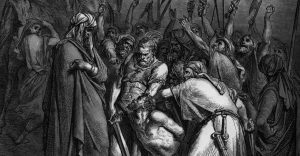What happens when Christians “do” Holy Communion? What’s the point of it? Is it just a visual aid—a symbolic depiction of something that can be communicated just as effectively by words? Is it something we really need?
Many of us might find it difficult to give clear answers to these questions—especially after the long period of online worship we have been through recently. Perhaps some of us still aren’t sure whether getting together for Communion makes any difference at all.
In this short article, I want to set out three things that Jonathan Edwards tells us about why we should take Communion seriously.
Remember: a Commemoration of Christ’s Death
This is perhaps the one thing that most Christians think of when they consider the meaning of Holy Communion. Remembrance is the most obvious aspect of the Communion. Jesus himself said during his Last Supper, “Do this in remembrance of me” (Luke 22:19; 1 Corinthians 11:24)
Jonathan Edwards said that Christ’s death “should be commemorated in the church in all ages by this representation of it in this ordinance [i.e., the Holy Communion].”[1] In a sense, this sacrament transfers our minds back across time. Every time Christians partake in the Holy Communion, we remember and even reenact Christ’s sacrifice which gives us life. And that’s a good thing. We are forgetful creatures. In the midst of the busyness and distractions of life, God has given us this sacrament to help us remember what Jesus has done. It is our duty to help our minds remember regularly by partaking in it as often as we can.
Hope: an Expectation of the Heavenly Feast
Holy Communion also transfers our minds to the future. This is probably not something a lot of Christians think of as they partake in Communion. But for Edwards, this was an important aspect of the sacrament. Communion is “a type of that eternal feast of the saints in heaven.”[2]
Imagine that: there are Christians having an eternal feast right now with Jesus at the head of the table—something that we, living Christians on earth, are looking forward to as well (see Isaiah 25:6; Revelation 19:9). We will join them when we get there. But for now, what we do during Communion is a “type”: a pointer towards that heavenly reality. Every time Christians partake in Holy Communion, we are participating in a spiritual feast together with all the saints—on earth and in heaven; from the past, present, and future. That future when we get together and actually feast with Jesus face to face will be “unspeakably happy and glorious”—so glorious that it will have to be experienced. But we can enjoy that experience now, to a small extent, as we partake in Holy Communion. Edwards constantly invited his church members to diligently participate in this sacrament for this reason. And he’s right. Who does not want to participate in that glorious heavenly banquet?
Now that it is possible for us to gather physically again, let’s listen to Edwards’s advice. Let’s eagerly and diligently participate in that “happy and glorious” feast with each other. God has brought that future glorious reality to the present in this sacrament. So, let’s enjoy it to the utmost!
Partake: a Symbol of Union with Christ
By far the most important aspect of Holy Communion, for Edwards, lies in the present. After all, just as Christ was present physically in the Last Supper 2,000 years ago, he is also present spiritually at every Lord’s Supper today. For Edwards, the Holy Communion is a physical sign of a spiritual reality: that Christians are joined together in Christ. So Christians cannot enjoy the physical sign without the spiritual presence of Christ. In fact, for Edwards, Communion represented “a marriage union” between Christ and believers.[3] And a wedding feast has to be celebrated with both the bride and the groom being present.
During Communion, therefore, we can expect to be reminded of all the spiritual blessings we presently get from our union in Christ. As we consume the elements, we are reminded that in Christ we get to eat the fruit of the Tree of Life and drink the water of life (Revelation 22:1–2).[4] However, above all its spiritual goodness, it is Christ himself whom we desire in Communion. “By our partaking of Christ’s body and blood,” we are blessed with “the person of Christ,” who remains the believers’ “treasure” and “pearl of great price.”[5]
We might be tempted to think that Holy Communion does not really make a difference to our daily spirituality. But Edwards would have strongly disagreed. Being reminded of our spiritual position in Christ in such a tangible way is good for us as we go through the ups and downs of life. Regardless of how we feel on a Sunday morning as we rush to church frantically with our small kids, or how busy and distracted we have been all week; no matter how many times we’ve had to fall on our knees to confess of our multitude of sins, we can be certain of Christ’s presence in our lives and the constant spiritual nourishment we get from him as we look forward to partaking in the tangible sign of his grace that Communion offers.
Further, because Holy Communion signifies our union with Christ, it also displays the union of all believers in Christ in the present. This gives us another reason to desire partaking in the Communion together with our church family rather than alone at home when we attend online church.
Holy Communion is a Gift
In Holy Communion God stoops down to our level to show the great mystery of our union with Christ in a very tangible manner. He does not just explain a complex theological concept to us and leave us to ponder about it. He lets us see, smell, touch, taste, and even participate in its reenactment. Even when we cannot see the cross of the past, or imagine our future feast, or comprehend our present union with Christ, Holy Communion still helps us get a small taste of this mysterious beauty.
[1] “Sermon on 1 Cor. 10:16(a)”, no. 156 [c. 1729–1731].
[2] “Sermon on 1 Cor. 10:16(b)”, no. 791 (Aug. 1745).
[3] “Sacramental Union in Christ”, no. 977 (Jan. 1751), WJE 25: 587.
[4] “Sermon on 1 Cor. 10:16(a)”, no. 156 [c. 1729–1731]
[5] “Sermon on 1 Cor. 10:16(a)”, no. 156 [c. 1729–1731].












